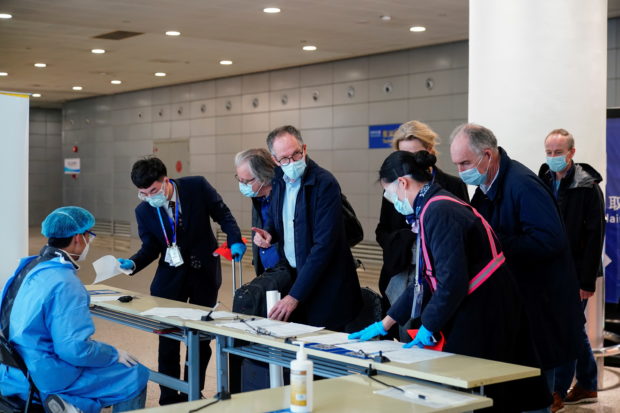US, WHO demand more data on origins of pandemic

FILE PHOTO: Peter Ben Embarek, and other members of the World Health Organisation (WHO) team tasked with investigating the origins of the coronavirus disease (COVID-19), arrive at the Pudong International Airport in Shanghai, China February 10, 2021. REUTERS/Aly Song
WASHINGTON — The United States and a World Health Organization (WHO) expert demanded more data from Beijing on Saturday about the origins of the coronavirus pandemic, after a WHO mission to China struggled to make headway.
A team of WHO experts and Chinese counterparts visited key sites around the city of Wuhan, where COVID-19 cases were first detected, but said they had not been able to shed light on the nature of early transmissions.
US National Security Adviser Jake Sullivan said his country had “deep concerns” about the early findings of the investigation.
Peter Ben Embarek, who led the WHO mission, told Agence France-Presse (AFP) in an interview his team had asked for more data, adding: “There is a mix of frustration but also a mix of realistic expectations in terms of what is feasible under which time frame.”
Origin still unclear
Experts believe the disease—which has killed nearly 2.4 million people worldwide—originated in bats and could have been transmitted to humans via another mammal.
Article continues after this advertisementBut while the virus was first discovered in Wuhan in December 2019, it remains unclear if that is when and where the contagion actually began.
Article continues after this advertisementThe fallout came as Europe’s death toll topped 800,000 and concerns over coronavirus variants that first emerged in Britain and South Africa forced ever tighter border controls.
Germany is ramping up its border security, closing its frontiers with the Czech Republic and parts of Austria.
“I must cross the border before midnight,” professional driver Ludvik Boucek told AFP on Saturday afternoon as he washed his truck at a service area at the western Czech crossing of Rozvadov. “I’m glad the company dispatcher told me about the closure. I hadn’t heard anything about it.”
Portugal, among the world’s hardest-hit nations, on Saturday extended the suspension of flights from Britain and Brazil to March 1.
On Friday, the government in Lisbon extended border controls with neighboring Spain until March 1.
The pandemic has also hit international sporting events with the Australian Open tennis tournament in Melbourne forced to continue without spectators as Victoria state enters its third lockdown since the pandemic began.
‘Sambadrome’
“The feeling is completely different—nobody wants this,” said Spanish great Rafael Nadal, referring to the 15,000 empty seats that faced him at Rod Laver Arena.
While the tennis has been able to continue, Brazilian officials have been forced to cancel Rio de Janeiro’s famed carnival. The city would normally be enjoying the booming beats, glittering floats and glamorous dancers, but instead the “Sambadrome” is this year hosting a COVID-19 vaccination drive.
“Instead of a party, we’re mourning our dead,” Nilcemar Nogueira, founder of Rio’s Samba Museum, told AFP. The virus toll in Brazil stands at more than 237,000, the second-highest number of deaths worldwide after the United States.
For more news about the novel coronavirus click here.
What you need to know about Coronavirus.
For more information on COVID-19, call the DOH Hotline: (02) 86517800 local 1149/1150.
The Inquirer Foundation supports our healthcare frontliners and is still accepting cash donations to be deposited at Banco de Oro (BDO) current account #007960018860 or donate through PayMaya using this link.